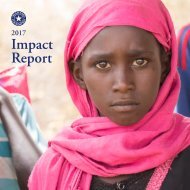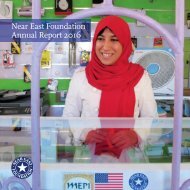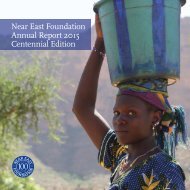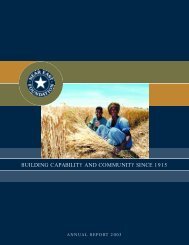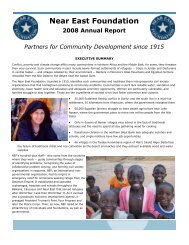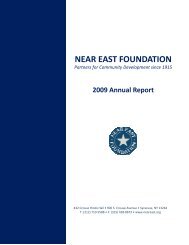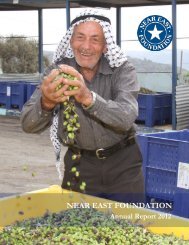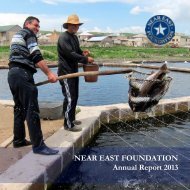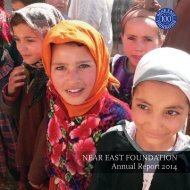2019 Near East Foundation Impact Report
Our 2019 Impact Report highlights key milestones and features stories from our work across nine countries to improve livelihoods, climate resilience, access to water and sanitation, and stability.
Our 2019 Impact Report highlights key milestones and features stories from our work across nine countries to improve livelihoods, climate resilience, access to water and sanitation, and stability.
You also want an ePaper? Increase the reach of your titles
YUMPU automatically turns print PDFs into web optimized ePapers that Google loves.
Investing in Climate Resilience in Mali and Senegal
Climate change is exacerbating already challenging environmental conditions in Sahelian communities, where most
people rely on agriculture and natural resources to sustain their livelihoods. In Mali and Senegal, climate extremes
manifest in droughts, floods, and wildfires. Climate change is causing higher temperatures and increasingly unpredictable
rainfall and weather patterns, impacting food security and local economies for rural populations in the Sahel.
Between 2015 and 2019, we worked with national, regional, and local governments in Mali and Senegal to establish
local climate adaptation funds that finance ‘public good’ investments designed to build community resilience to
climate change. In partnership with Innovation, Environnement et Développement en Afrique and the International
Institute for Environment and Development, we worked with community members to prioritize and implement 150
resilience investments that benefited over 900,000 people, spanning forest restoration, agricultural development,
pastoral management, and water management systems. Vulnerable communities were prioritized through investments
in participatory, local level processes that included women and youth.
In the Mopti region of Mali, we are working to reduce poverty and conflict while improving
food security and climate resilience through inclusive community management of shared
resources, built capacity for conflict mitigation and management, enhanced agricultural
production, and greater market orientation for key agricultural value chains, such as
rice, sesame, fonio, and non-timber forest products. Between 2012-2019, this work
improved the food security of more than 130,000 people, introduced eco-efficient
practices across more than 4,000 acres, and supported the development of more
than 20 water resource management plans.
Improving Agriculural Water Mangement in Palestine
Restricted access to land, water, agricultural inputs, and markets has harmed the Palestinian agricultural sector.
Cut off from new and improved agricultural technologies, Palestinian farmers rely heavily on traditional practices,
making it challenging to increase their productivity and incomes.
Fostering Women’s Resilience in Sudan
Millions of people depend on non-timber forest products for income and
subsistence. However, many small-scale producers and harvesters in Sudan lack
access to information on markets and sustainable management practices. Barriers
are greater for women, who play a significant role in collecting, harvesting and
selling, yet historically have weaker negotiating positions with traders.
To address this challenge, we established a public-private partnership to facilitate the
adoption of advanced farming technology and overcome water scarcity in the
Palestinian agricultural sector, while increasing farmers’ crop yield and access
to capital. Working with Netafim, the Palestinian Center for Agriculture
Research and Development, three local banks, and the Palestinian Vegetable
Council, we helped more than 100 farmers adopt advanced irrigation
systems with crop management technologies. The new technology led
to reduced water and fertilizer use while simultaneously increasing
productivity and incomes.
In partnership with Friends of Peace and Development Organization and
Abna Al-Sudan Development Organization, we are strengthening women’s
associations to help women upgrade their non-timber forest products, develop
of those in the
non-timber forest
formal packaging and branding, and establish better linkages with wholesalers.
Greenhouse, Jenin
72%
product sector are
These efforts reduce local forest degradation, protect resource-based livelihoods,
State of the art ‘fertigation’ technology is helping farmers
women
and increase income.
grow more with less.
13 14








